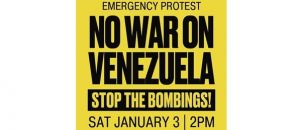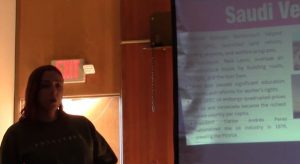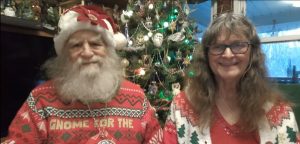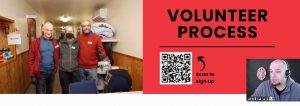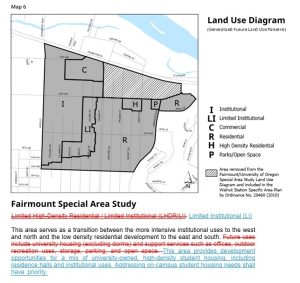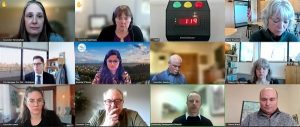Julie Lambert and KEPW welcome peace activist David Hazen
10 min read
Presenter: In a time of war, KEPW’s Julie Lambert interviews peace advocate David Hazen.
David Hazen (LoveAlwaysWins.us): I became a peace advocate, probably before I was born, but I didn’t know it until I was classified 1-A in the Selective Service System during the Vietnam War, went through the whole conscientious objector appeal process and was about ready to be inducted into the armed service, I was mentally preparing myself to refuse induction, and then I aged out of the system, which was just a stroke of lucky timing.
[00:00:45] I’ve really become more organized and thoughtful about my activism after 2004, when Dennis Kucinich came to Eugene and he was on his campaign to become president, and he introduced the idea of a cabinet-level U.S. Department of Peace.
[00:01:11] And I was so enthralled by that idea I became the Oregon state coordinator for that campaign. I went to Washington D.C., I learned how to lobby congressmen. It was very exciting times and eventually I kind of got burned out on talking to polite legislative aides and feeling like, ‘This is going to be a very long, long campaign.’
[00:01:40] And that what needed to happen was the grassroots groundswell of voters and even children saying, ‘We need peace and we need it now.’
[00:01:52] And so I then refocused my efforts on creating a ‘City of Peace’ and I learned about the International Cities of Peace and I signed up. I was one of the first people to sign up with that organization and I worked on that, well, for about 10 years.
[00:02:09] And eventually I got, well, burned out on doing that too. I just didn’t feel like there was enough support here locally. But right now I’m renewing that thought. That kind of brings me up to the present.
[00:02:23] In the process, I’ve written a couple of books about the culture of violence and how it can be transformed into a culture of nonviolence. The first book was called Love Always Wins, which loosely translated means that Letting Old Vanity Evaporate–which is what the acronym LOVE stands for: Letting Old Vanity Evaporate–is the best strategy for creating win-win solutions.
[00:02:58] And the second book was The Work of Love, which is an actual workbook of self-examining one’s own involvement in the culture of violence—because it’s very subtle, it’s very hidden—and working one’s way out of that culture into more harmony, forgiveness, acceptance, and real, real change.
[00:03:28] And I’ve made, oh, many videos about the homeless population because that has really caught my attention. I myself have felt like I did not belong here on this planet at all for many years of my life. And so I’ve interviewed a lot of homeless people. I’ve interviewed people who serve homeless people and looked a lot at that situation trying to find out how can we work our way out of that. It’s a very sticky, complex situation.
[00:04:05] And you cannot build your way out of homelessness. You cannot arrest your way out of homelessness. It has to be a whole community effort.
[00:04:15] Julie Lambert (Legalize Survival): What I have seen in this administration that I have not witnessed in previous administrations is that fear is a way to control the people. I’ve seen it demonstrated in ways that I had only read about in books like 1984 or in Animal Farm that I never thought that I would witness. And sometimes I have to pinch myself and say: ‘Is this really what I’m seeing?’
[00:04:42] David Hazen: Yeah. It’s the old philosophy of ‘divide and conquer.’ Keep the people fighting amongst themselves, labeling each other as this, that, and the other bad thing, vilifying each other and you just stand and watch things fall apart.
[00:05:04] In doing so you become the king, the dominator, the controller. But the truth is you never do. You never can. It’s just a—it’s a fairytale. What I’m saying is that there are natural consequences, just like:
[00:05:22] I compared this culture of violence to alcoholism. (Mm-hmm.) Simply because I’ve been there, I was 20 years using chemicals to alter my mood. And violence is a way of altering one’s mood. Domination, it alters one’s mood and it gives one a temporary feeling of control.
[00:05:45] And it is very similar to the end stage of alcoholism when the alcoholic is out of control and is damaging everyone around him, including himself.
[00:06:01] It’s a symptom of the end stage of the culture of violence that violence just gets worse and worse and worse. I got my fingers crossed that we do not go into nuclear World War III.
[00:06:14] Julie Lambert: I have never felt that that was an actual real credible threat in my lifetime. But now it’s, it’s actually possible.
[00:06:25] David Hazen: Somebody has documented the number of near misses of nuclear accidents, like a bomber accidentally dropping a bomb on somewhere in the Southeast United States. Fortunately it did not detonate, but somehow it slipped out of the airplane.
[00:06:49] And another time when missiles were being launched in the United States as some sort of practice to exercise, they were detected by the Russians and the Russians were about ready to counterattack when somebody within the defense radar network of the Russian military decided that, ‘No, this is not an actual attack,’ and they prevented it.
[00:07:18] I mean, there are so many of these little, I would call them, miracles that have prevented World War III.
[00:07:34] From my own experience, I believe we have to be scared… terribly scared before we are willing to consider alternative ways of being and doing.
[00:07:42] So this brings up the question of how do we continue, one day to the next, in what we could characterize as an all-systems breakdown: the physical, the economic, the political, emotional, everything is crashing.
[00:08:04] And it seems to be happening faster and faster. We can’t even follow with it, and somehow we want to just shut it down. But that’s why a lot of people are escaping into drugs is because, ‘Hey, this is, I just can’t even think about this, I just want to be out of the room. Get me out of here. Get me off this merry-go-round.’
[00:08:25] Even though things are terrible, and things are dark right now, if you look for them, there are these signs and so there’s reason to hope. It might be just a coincidence, but I’ve noticed a sudden surge of people looking at what are the positive aspects of what is happening right now, that things are shifting.
[00:08:52] Julie Lambert: Mm-hmm. What would you give as an example of hope?
[00:08:57] David Hazen: Three examples. A very small one is there is a small volunteer organization called Neighbors Feeding Neighbors (Yes!) that shows up underneath the Washington Jefferson Bridge four days a week to feed breakfast to whoever wants it. (Sure.)
[00:09:16] And I’m one of those volunteers and it does a lot for me. It does a lot of personal good for me to feel that I’m doing something. I’m not saving the world, but I’m doing something.
[00:09:29] Also, what’s now called Stronger Together, a series of interfaith potlucks with keynote speakers that are happening, I think about once a month, between the Christian / Jewish community, and I’ve also seen Sufis, Buddhists, I haven’t seen any Muslims there yet, but we know they’re invited and it’s very exciting to meet people across those kind of religious divides.
[00:09:58] And when we go out and do a No Kings rally, it’s bigger than anything ever that has ever happened in Eugene.
[00:10:09] Julie Lambert: I’ve never seen anything like it.
[00:10:10] David Hazen: And it gives us this strong feeling of we’re not alone. We’re doing this together, and we don’t know exactly where we’re going with this and how it’s all going to turn out, but we feel empowered because we’re not alone. And that’s huge.
[00:10:29] We, the people, are the movement. We are the change. What we’re seeing in the halls of power is a reactionary response of attempting to create social control using old-fashioned, outdated, obsolete means of doing so, and it will work temporarily, but ultimately it’s not going to work.
[00:10:55] I compare the situation to an upstream dam breaking and this flood of disaster coming into Eugene and wiping out the core of the business area and a lot of the residential area and people evacuating and trying to save themselves. And then asking themselves: ‘Why did this happen? Why didn’t somebody monitor the situation, prevent the situation from developing into collapse?’
[00:11:28] You know: ‘Why were we so oblivious?’ (Mm-hmm.) ‘And now here we are, and what can we do to restore and rebuild?’ It’s a rather devastating prospect, but I think we’re up to it. I really do.
[00:11:45] When I very first entered the peace activism, I learned about this ancient martial artist named Sun Tzu who said that the highest skill is to win without fighting. And I think that’s what we have to focus on now, because the temptation of these protests is to get violent or to get stronger, to somehow attack or counterattack the things that ICE is doing.
[00:12:22] And people are endangering themselves because you cannot fight the culture of violence because it has all the weaponry, it has all the power, and it only makes it stronger when you try to fight it, because it’s like a dragon. It just starts to rise up and shoot you down with flames and other assorted weaponry.
[00:12:47] So I’m very interested in subtle activism in self-management of our own reaction so that we’re not reacting, but actually being proactive and preventative so that we’re in here for the long haul. We’re going to stay out of the line of fire, but we’re going to make change happen.
[00:13:10] We’re going to do it in such a way that it, well, they call it subversive. It’s undercover, and it’s unseen until suddenly ‘Oh my God.’ The media wakes up and starts reporting on, ‘ Hey, things are really different now.’
[00:13:27] We’ve got to keep changing our attention to the people that are actively trying to build consensus and agreement on common ground across the divides, the people that are reaching across and using things like nonviolent communication to build rather than tear down.
[00:13:50] There was this rally where the Raging Grannies sang that was at the fountain near the new City Hall. And there were speakers and one of them said, The best thing you can do now is talk to your neighbors. (Yes.) Get to know your neighbors, because that starts to build solidarity.
[00:14:11] And it doesn’t matter if they’re Republican, Democrat, or apathetic, if you talk to your neighbors, you start to build this consensus about what’s good, what’s right, what’s next to do.
[00:14:27] Julie Lambert: Before we go, are there any specific organizations that you could recommend to folks that might be helpful for them to find their way at this difficult time?
[00:14:39] David Hazen: Well, all right, several flash across my mind.
[00:14:42] I’m part of the Nobel Peace Laureate Park. I’m on the board. It’s a way of documenting the American winners of the Nobel Peace Prize and inspiring new young peacemakers.
[00:14:55] There’s the Center for Dialogue and Resolution. There’s no local training now in nonviolent communication, but that’s something you could probably learn online. And also the Metta Institute for Nonviolence is one that has trainings, the self-directed trainings in nonviolence. Metta Institute is in Sausalito.
[00:15:19] Julie Lambert: We are Eugene’s Resistance Radio chatting with David Hazen and he’s bringing a message of peace for us. David, do you have any advice for folks here locally who are feeling frustrated that, you know, ‘How can I possibly influence people to do any kind of meaningful change?’ What would you say to those folks?
[00:15:41] David Hazen: Start talking to your neighbors, and people you wouldn’t necessarily talk to, not always talking to the same people all the time, but get out there.
[00:15:53] I mean, I’m an introvert and I think it’s important for us introverts to stretch ourselves out of our comfort zone a little bit and find out the stories that other people tell about their lives. So search for common ground. It’s out there.
[00:16:14] And I think the primary thing right now is to avoid the downers. Pay attention to how your mood has been affected by what you’ve heard, what other people have said, what you’ve seen: images, even images of people fighting, are a downer.
[00:16:35] Try to include in your life something that uplifts you: music, poetry, dancing, singing, or even just deep breathing. I’ve recently discovered the powerful healing effect of taking long, long inhales and even longer exhales because physically that gets you outside of your mind and into your body, and what’s called your parasympathetic nervous system starts to calm down.
[00:17:10] We need to remember what Yoda said: Fear leads to anger, and anger leads to hate. And then that leads to the dark side.
[00:17:19] Julie Lambert: That’s a beautiful way to wrap it up. Thank you, David Hazen, for being with us.
[00:17:24] David Hazen: I do have a website with a lot of links to things I’ve written, videos I’ve made, podcasts that I’ve made, and it’s LoveAlwaysWins.us, that’s all one word. And there’s a place there where people can send me comments and questions.
[00:17:46] Julie Lambert: We really appreciate your contributions to our community and we hope to have you on soon again.
[00:17:52] Presenter: You can contact peace activist David Hazen through his website, LoveAlwaysWins.us. Julie Lambert can be heard regularly on Legalize Survival Wednesday nights at 7 on KEPW 97.3, Eugene’s PeaceWorks Community Radio.

